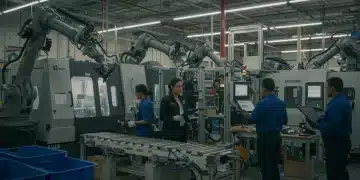Labor market trends in the US: what you need to know

Labor market trends in the US indicate increased demand for tech skills, a rise in remote work, and the importance of soft skills, highlighting the need for continuous learning and adaptability in a rapidly changing job landscape.
Labor market trends in the US are constantly evolving, impacting how we approach employment. Have you noticed changes in job availability and industry demands? Let’s dive into what’s shaping today’s workforce.
Understanding current labor market trends
Understanding the current labor market trends is essential for anyone looking to navigate today’s job landscape. These trends can provide insights into what industries are thriving and what skills are in demand.
Shifts in Employment Sectors
Recent data showcases significant shifts in various sectors. For example, technology and healthcare are experiencing rapid growth. As businesses adapt to new technologies, they require a workforce with specific skills. This trend highlights the importance of continuous learning and skill development to stay relevant.
Key Skills Needed Today
As the job market evolves, so does the demand for specific skills. Professionals seeking employment should focus on:
- Digital literacy: Proficiency in digital tools is crucial.
- Communication: Effective communication remains a top skill.
- Adaptability: The ability to adjust to changing environments is invaluable.
Moreover, industries are increasingly valuing soft skills alongside technical skills. Employers are looking for individuals who can work well in teams, solve problems creatively, and handle challenges effectively. This shift underscores the significance of a balanced skill set that combines hard and soft skills.
Another trend worth noting is the rise of remote work. The pandemic accelerated this trend, allowing employees to work from anywhere. As a result, companies are now considering global talent pools, making competition fiercer. Job seekers must recognize this shift and tailor their applications to stand out in a broader market.
Impact of Automation and Technology
The advent of automation and advanced technologies plays a critical role in shaping labor market trends. Many routine tasks are now performed by machines, creating a shift in the types of jobs available. While automation may eliminate some positions, it also creates new opportunities in tech-driven fields.
Looking ahead, understanding these trends is vital for anyone trying to secure a fulfilling job. Keeping an eye on emerging industries and the evolving demands can provide a competitive edge. As we see how innovation impacts the working world, staying informed will give job seekers the advantage they need.
Key factors influencing job opportunities

Key factors influencing job opportunities are crucial for understanding the landscape of the labor market. These elements shape how and where we find employment. Grasping these factors helps job seekers make informed decisions.
Economic Conditions
The state of the economy significantly impacts job availability. When the economy is thriving, businesses are more likely to hire. Conversely, during recessions, companies often cut back on hiring. Staying aware of economic indicators can give job seekers an idea of when to pursue new opportunities.
Skill Demand
Another essential factor is the demand for specific skills in the workforce. Industries like technology, healthcare, and renewable energy are rapidly evolving, requiring new skills. Job seekers should focus on developing skills that align with these high-demand fields:
- Technical skills: Proficiency in programming, data analysis, or digital marketing.
- Soft skills: Effective communication, teamwork, and problem-solving abilities.
- Adaptability: Being open to learning and adjusting to new challenges.
Moreover, networking plays a pivotal role in uncovering job opportunities. Many positions are filled through referrals, making connections in your industry essential. Attending industry events and engaging in professional organizations can expand your network significantly.
Additionally, geographical location influences job availability. Some regions may have a high demand for certain jobs, while others may have saturated markets. Therefore, job seekers often need to consider relocation to pursue better prospects. This trend is especially prevalent in fields such as tech, where cities like San Francisco and Seattle attract talent.
Impact of Technology
Lastly, technology continues to transform the job market. Automation and artificial intelligence are changing the types of jobs available. While some positions may diminish, technology also creates new roles that require human oversight and creativity. Understanding how technology affects your industry is vital for recognizing where opportunities may arise.
Keeping these key factors in mind can help job seekers navigate the complexities of the job market, aligning their skills and efforts with the current landscape. Awareness of these trends is akin to having a roadmap that guides you through the twists and turns of finding the right career.
The impact of technology on employment
The impact of technology on employment is profound. With rapid advancements, the way we work and the types of jobs available are continually changing. Understanding this impact helps job seekers prepare and adapt for the future.
Shifts in Job Roles
Many traditional job roles are evolving due to technology. For example, tasks that were once performed manually are now automated. This shift often leads to the creation of new roles focused on overseeing and developing these technologies. Workers must embrace this change and upskill to remain competitive.
Emerging Technologies
Technologies like artificial intelligence and machine learning are driving significant changes in various sectors. Companies increasingly rely on data analytics, virtual collaboration tools, and automation to enhance productivity. The demand for professionals proficient in these areas is growing:
- Data scientists: experts who analyze and interpret complex data.
- AI specialists: professionals who develop and implement AI solutions.
- Cybersecurity experts: individuals who protect organizations against digital threats.
As technology evolves, many industries are also recognizing the importance of human skills and creativity. While machines can replace repetitive tasks, they cannot replicate human critical thinking and emotional intelligence. This balance underscores the need for a workforce that blends technological proficiency with essential soft skills.
Furthermore, remote work technology has gained traction, allowing employees to work from different locations. This flexibility has expanded job opportunities and workforce diversity, connecting employers with talent worldwide. However, it also requires new skills in digital communication and collaboration.
Job Market Disruption
Despite the benefits, technology can also disrupt job markets. As automation replaces some jobs, workers may find themselves needing to shift careers. This transition often requires additional education or training in emerging fields. Thus, awareness of technological advancements is critical for navigating the changing employment landscape.
Staying updated on these developments can help job seekers align their skills and career goals with the future job market, ensuring they remain relevant in an increasingly tech-driven world.
Future predictions for the US labor market

Future predictions for the US labor market indicate significant changes in how jobs will look in the coming years. Understanding these predictions can help job seekers prepare for what lies ahead.
Technology and Job Creation
Advancements in technology are set to create new types of jobs that we cannot yet fully imagine. Fields like artificial intelligence, renewable energy, and biotechnology are expected to see growth. As companies invest in technology, the demand for skilled workers will rise, especially in tech-related roles. This shift means that individuals must focus on developing their technical skills to stay relevant.
Increased Demand for Flexibility
The rise of remote and flexible work is also predicted to continue. Many employees prefer jobs that allow them to work from home or have flexible hours. Companies recognize this trend as they seek to attract and retain talent. Therefore, future job postings are likely to emphasize flexibility as a key benefit, altering how businesses view work-life balance.
- Hybrid work models: Many organizations will adopt hybrid work arrangements.
- Remote opportunities: Job seekers will find more positions that allow remote work.
- Focus on results: Employers will prioritize employee performance regardless of location.
As skills like digital literacy become more important, the emphasis on continuous learning will grow. Workers will need to adapt and learn throughout their careers to keep pace with technological developments. Lifelong learning will become essential, with many professionals seeking additional certifications and training to enhance their qualifications.
Shifts in Industry Needs
Certain industries are anticipated to experience stronger growth than others. Health care, technology, and green jobs will likely lead to job creation. As the population ages, the need for healthcare professionals will increase, providing stable employment opportunities. Additionally, the green economy will push for more jobs related to sustainability and environmental protection.
Moreover, soft skills will remain critical in many sectors. Employers will continue to value communication, empathy, and problem-solving abilities as vital competencies. Building these skills is essential for success in an evolving job market.
Proactively preparing for these trends will provide job seekers a competitive edge. By focusing on relevant skills and adapting to changes, individuals can position themselves effectively for future opportunities in the labor market.
FAQ – Frequently Asked Questions about Future Predictions for the US Labor Market
What are the key industries expected to grow in the future labor market?
Industries such as technology, healthcare, and green jobs are anticipated to experience significant growth.
How is technology changing the job landscape?
Technology is creating new types of jobs while automating many traditional roles, requiring workers to adapt and acquire new skills.
What is the importance of soft skills in the future job market?
Soft skills like communication, teamwork, and problem-solving will be essential as employers seek well-rounded candidates.
How can job seekers prepare for changes in the labor market?
Job seekers should focus on continuous learning, develop relevant skills, and stay informed about industry trends to remain competitive.





